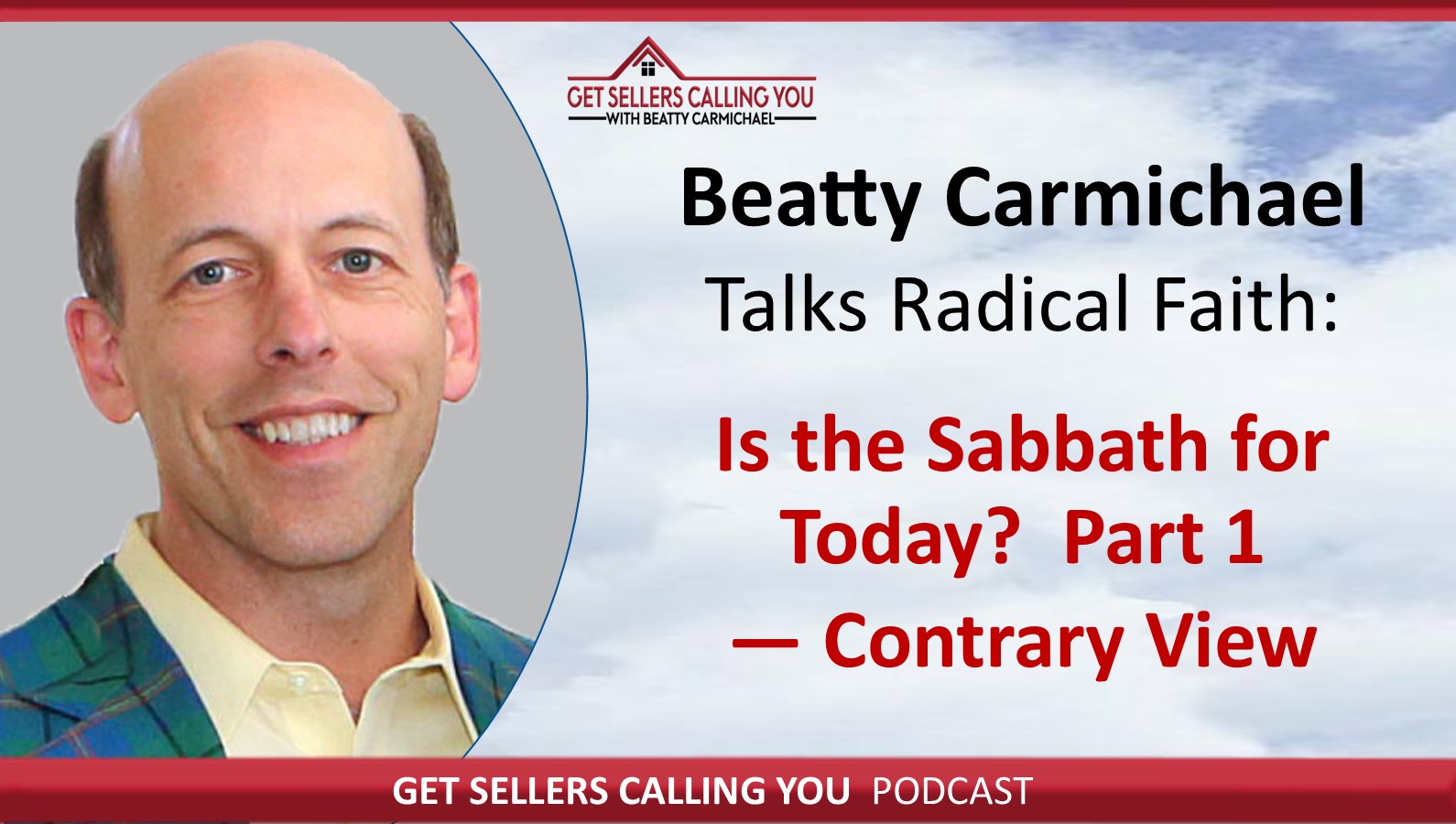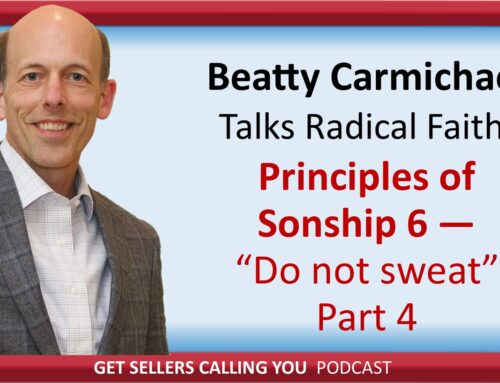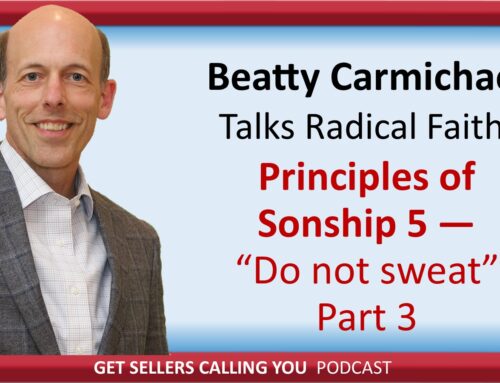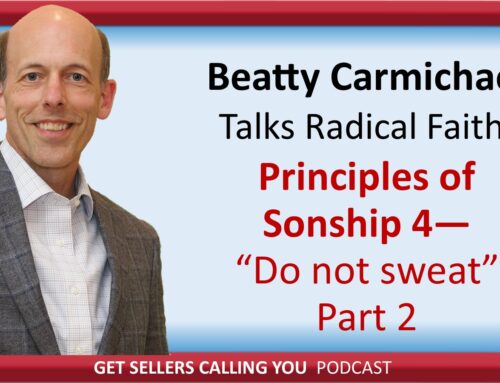Listen via YouTube video if desired
Transcription (was completed by automated process. Please ignore any speech-to-text errors)
Penny: [00:00:00.18] Well, hello, everyone, I’m so glad you joined me again, my name is Penny, and I am joined here today with my great friend Beatty Carmichael Beatty is the CEO of Master Grabber, the creator of Agent Dominator and one of the top marketing experts in the real estate field. Beatty. I’m super excited about our call today. I think you’ve got some great things to share with our listeners. Can you give us a little input on what we’re going to be discussing today?
Beatty: [00:00:29.25] Well, actually, I think you’re wrong. I have nothing good to share with our listeners today. We’re just going to babble and give absolutely nothing worth no content worth listening to. How’s that?
Penny: [00:00:40.47] That sounds wonderful, but disappointing.
Beatty: [00:00:44.37] Yeah, and definitely not the norm. So that was a joke for our listeners who are first timers. Yeah. So today I’m excited because we’re going to teach on topic. This is, by the way, for those who are new. This is what we call our radical faith topic, and we do two types of podcast on this series. One is on this channel anyway. One is real estate marketing. The other is living your life faithfully as a Christian. So today’s topic is on the living your life as a Christian. And that means if you don’t have any interest in that topic, just skip this episode and come back to the next. But Penny, I was going to do a special topic for this next series, and the Lord changed it, and it’s a topic I’ve been filling. He wanted me to talk on a while back, so now we’re going to actually do it. And the topic for today and this will be a multi-part series is the title is the Sabbath still for today. So just kind of set the stage there. Basically, two camps in Christendom on this one camp says that you need to still observe the Sabbath, and the reasoning they give is primarily that it’s what God commanded us to do and his commands are still there. Yeah, and there’s plenty of scriptures to back that up. And then there’s the other camp that says we’re no longer to observe the Sabbath, and there’s plenty of scriptures to back their position up as well. And their position is as part of the old covenant. The old covenant is obsolete. Christ has issued a new covenant. Paul tells us the same no day better than another and things of that sort. So what we want to do today is kind of figure out which is the right answer. And just out of curiosity, which can’t be you sit in.
Penny: [00:02:48.54] We do. We do believe that a Sabbath is important in our family. Okay.
Beatty: [00:02:55.67] And very good. I do, too. The question is, do you believe that the Sabbath is still, how best to say, commanded by the Lord to to treat it special? Or do you simply as a family, feel that you treat it special as a day of rest simply because it’s a good idea? It’s a good practice, and it’s simply your way of honoring the Lord through it.
Penny: [00:03:28.29] I would definitely say the latter. I feel like we it’s a principle that we do out of the overflow of our honor and respect for God. And so it’s more of like a we do this like it’s not like a we don’t feel like it’s a command like you have to we feel like it’s a I get to I get to honor the Lord by giving him a Sabbath. If that makes sense,
Beatty: [00:03:54.06] That makes a lot of sense. It’s the idea of you give faithfully and generously from the heart, not under compulsion, but as a way of being generous and giving back.
Penny: [00:04:05.37] Yes, that’s right.
Beatty: [00:04:06.81] Totally get it. And I think that’s a very great response. So what I want to do is I want to look at the verses on why the Sabbath should not be honored. Let me rephrase it why it’s no longer valid as a command. Ok, OK. It doesn’t mean that we don’t do it. It simply says these are the passages that are focused on why it’s no longer. And I don’t want to use a command as I think that’s only that’s the best word I can come up with right now. A command? Ok. But I think it’s different. I don’t want to make it too harsh, but something that God says, I want you to do it. This is part of who I am, and these are the passages I want to go through that says, Well, no, that’s how old covenant stuff. And it’s not the New Covenant relationship that we have today. Ok. So generally speaking, I think the the direction that we see primarily in the New Testament are four things as relates to, and I’m just going to use the topic the Sabbath is no longer required, OK, or no longer valid. However, you may want to use that word either required or valid. And the first thing is the Sabbath was actually a sign of the old covenant.
Beatty: [00:05:30.60] We’re going to look at each of these passages, but I just want to kind of give you the lay of the land. First thing that people look at in the New Testament very clearly is that it’s a sign of the old covenant. We’re now under a new covenant. The second thing that is focused on is that Christ initiated a new covenant with us, making the old covenant obsolete. Hmm, hmm. Then Paul teaches that word to not esteem one day any greater than another. And then we also find that we’re actually in the Sabbath rest of God already. Ok, so those are the four things now I just want to put some scripture around these four topics and kind of show you where this comes from, from the Bible. Do you have your Bible ready? I do. Great. Let’s do all of these in the ESV for right now. Ok, let’s go back to where it all begins or almost where it all begins. Let’s go to Exodus thirty one versus 12 and 13, and what we’re going to do is we’re going to look at the Sabbath is a sign of the old covenant.
Penny: [00:06:38.14] Ok, OK. Exodus. Thirty one verse 12 and 13 and the Lord said to Moses, You are to speak to the people of Israel and say, above all, you should keep my Sabbaths for this is a sign between me and you throughout your generations that you may know that I’ve the Lord sanctify you.
Beatty: [00:07:00.84] So this is where we get that the Sabbath is the sign, by the way, did you did you recall that the Sabbath was actually a sign of the Mosaic Covenant?
Penny: [00:07:10.29] Yes.
Beatty: [00:07:11.07] Ok, good. So the question that is bad to be asked is what is the sign? Yeah. What do you think, what what is a sign, is this a sign of something? What does that mean?
Penny: [00:07:25.57] Um, I think it’s a representation, a sign can be a representation, or it could also be, gosh, it could be a lot of things depending on context. It could be a direction. It could be guidance. I think most generally, it would probably to me a sign would be like a representation or just sort of a example, so to speak. Yeah.
Beatty: [00:07:59.28] And I think we’re kind of skirting it. So if we think of really a sign, it’s as my pastor says, a sign is something that is significant, OK, like you come into a town and it says, welcome to the name of the town. It’s a it’s it’s a passing point that points you to something that tells you that you’ve either arrived or you’re headed somewhere. It’s sort of like what you’re talking about a direction. Ok, yeah.
Penny: [00:08:23.87] Yeah.
Beatty: [00:08:25.08] So what was the sign for?
Penny: [00:08:29.30] In this particular passage,
Beatty: [00:08:30.83] Yeah, in this passage, just read it, it says that for this is a sign between me
Penny: [00:08:35.65] And you mean you throughout your generations that you may know that I the Lord, sanctify you. So the sign is that the Lord is the one who sanctifies us.
Beatty: [00:08:44.51] Ok, great. And are we sanctify today?
Penny: [00:08:47.72] Yes.
Beatty: [00:08:48.74] And how are we sanctified
Penny: [00:08:51.68] By the blood of Jesus
Beatty: [00:08:53.18] Are by the blood of Jesus. So if we’re already sanctified today? And the Sabbath was a sign in the old covenant, pointing to the fact that God sanctifies us, then do we need a sign any longer?
Penny: [00:09:11.72] Ask me that again.
Beatty: [00:09:12.94] Okay, if the Sabbath was a sign. Of the old covenant, the sign that says it’s the Lord who sanctifies you and now in the New Covenant, we’re sanctified by the blood of Christ. Do we still need a sign of the old covenant? Pointing to what we already have?
Penny: [00:09:35.69] I don’t necessarily think we we need this sign, but I do think that it’s still an important practice because I believe Jesus even reminded people to do it in the New Testament.
Beatty: [00:09:49.04] Ah, OK, you’re getting ahead of us, so we’re going to hold out. No, no, that’s fine. I’m just teasing you. But yes, so now so now we start to see a little bit of a conundrum. Yeah. Yes, it’s a sign. But what is it, really? And the whole focus of this series is really understanding what is the Sabbath? Because the Sabbath is actually used, the phrase the Sabbath is used in multiple capacities. And here the Sabbath seems to carry multiple meanings. One meaning is it’s a sign. And so for those people who say, Well, you don’t, you don’t follow and observe the Sabbath anymore because it’s a sign of the old covenant, we’re now under a new covenant. This is where they’re getting that understanding. Ok?
Penny: [00:10:38.16] Got it!
Beatty: [00:10:38.61] Ok, so now let’s look at the next thing that people talk about as relates to the Sabbath being no longer required or valid. And that is that it’s part of the old covenant. And the old covenant is obsolete. So the Sabbath is as part of the old covenant, so the old covenant is what God gave to the nation of Israel and to Moses in the form of the Ten Commandments that’s called the covenant. And the Sabbath is the fourth commandment. Thou shall keep the Sabbath holy. All right. Yeah. And then you also have, as part of the law what’s called Sabbath Day regulations. How do you keep the Sabbath holy and there regulations that you did? But now that Christ has initiated a new covenant? The old covenant is made obsolete. That’s the summary of what we’re going to see in scripture right now. So let’s turn to Hebrews eight 13.
Penny: [00:11:45.42] Ok.
Beatty: [00:11:46.74] And this is speaking of Jesus when it uses the word heat.
Penny: [00:11:50.61] Ok. All right. Hebrews eight, verse 13 reads. And speaking of a new covenant, he makes the first one obsolete and what is becoming obsolete and growing old is ready to vanish away.
Beatty: [00:12:04.17] Okay, so if we’re under a new covenant and that makes the old covenant obsolete and starting to go away, are we still to obey the terms of the old covenant? So just keeping the Sabbath Day holy, is that still a requirement or something that we simply do of our own heart, but not really a requirement of the Lord?
Penny: [00:12:30.18] But I think it would fall into the category of not necessarily being a requirement.
Beatty: [00:12:37.38] Ok, very good. Now I want to pose a conundrum for you.
Penny: [00:12:43.83] Ok.
Beatty: [00:12:45.69] All right. So if it’s not a requirement because it’s of the old covenant, then does that mean that thou shall not commit? Adultery is also not a requirement, but just something in the heart? Yeah, good point. So we start to get in some challenges, don’t we?
Penny: [00:13:02.58] Yeah, yeah. All right.
Beatty: [00:13:04.07] Let’s look. Let’s fast forward to coefficients or actually we’re going to go backwards technically. Colossians two vs. 16 and 17.
Penny: [00:13:15.89] Pay. All right, Colossians two, verse 16 and 17 says therefore let no one pass judgment on you in questions of food and drink or with regard to a festival or a new moon or a Sabbath. These are a shadow of the things to come, but the substance belongs to Christ.
Beatty: [00:13:38.85] Okay, so the sentence structure is kind of hard to grasp at all. But if we take out the key points, I want to reread this and just kind of truncate it to kind of simplify. And it says this let no one pass judgment on you with regard to a Sabbath. It is a shadow of things to come. So, in other words, to pass judgment on you and in regards to Sabbath, does that seem to indicate that if they pass judgment on you, it’s because you’re not doing it right or not doing it at all? Is that what the idea of someone passing judgment on you means?
Penny: [00:14:18.25] Yes.
Beatty: [00:14:18.94] Yeah, yeah, that’s why I would read it too. So if we’re not to let no one pass judgment on you with regards to a Sabbath, that seems to indicate that we’re no longer to have to observe the Sabbath. Does that make sense?
Penny: [00:14:32.56] Yes. Yeah. Okay.
Beatty: [00:14:34.63] So all of that is the covenant is obsolete. The Sabbath is part of the old covenant. We’re now under a new covenant. Let no one judge you based on the terms of the old covenant because we’re now under the new. So that’s what we’re looking at from scripture there. But then. There’s a third thing that people talk about, and I hear this a lot that is, well, the Sabbath isn’t a special day. We’re not to esteem any day more than another because Paul says it that way. And there’s actually a couple of spots where he does. So let’s look at those because all of these are really valid. And these are the things that bring up the questions, because kind of like you in my heart, I know I need to honor the Sabbath as my way of honoring the Lord. But I do it from the heart. But it’s not a command, we think. And these are the passages that start to create this, this confusion of what’s going on. So let’s look at Romans 14 versus five and six.
Penny: [00:15:43.36] Uh, Romans 14. Five and six. Ok. All right, Romans 14, five and six. One person esteems one day as better than another, while another seems all days alike. Each one should be fully convinced in his own mind. The one who observes the day observes it in honor of the Lord. The one who eats eats in honor of the Lord since he gives thanks to God. While the one who abstains abstains in honor of the Lord and gives thanks to God.
Beatty: [00:16:16.36] Ok, so this is basically saying, you know, do what your heart directs, right? And fully convinced in his own mind that says, you know, each one should be fully convinced in his own mind and then do those things that he’s convinced of. This is this kind of mirrors what Paul was talking about, like eating food, eating food that was sacrificed to an idol is not wrong. But if you believe it’s wrong, then it’s sent to you. But Paul says, I can eat that food because I know it’s not sent because the food is not sinful. But believing it to be wrong and then doing it, that’s where it sin. You remember that passage that Paul is talking about?
Penny: [00:17:00.76] I feel like I do. Yes. Yeah.
Beatty: [00:17:02.29] So that’s basically what he’s saying here is each one should be fully convinced in his own mind. And that means if you’re convinced that you ought to treat one day as better than another or observe one day in honor of the Lord, then you need to do it. But if in your mind you don’t feel that way, then you don’t need to do it. So that’s what this seems to be indicating. Would you agree on that?
Penny: [00:17:27.53] I would. Yes, absolutely.
Beatty: [00:17:29.48] Ok, let’s look also at Galatians four nine through 11. So this is Paul speaking again, and he shares a little bit more insight on this topic.
Penny: [00:17:41.00] Ok. All right. Galatians four verse nine through 11 says. But now that you have come to know God or rather to be known by God, how can you turn back again to the weak and worthless elementary principles of the world whose slaves you want to be once more? You observe days and months and seasons and years. I am afraid I may have labored over you in vain.
Beatty: [00:18:06.89] All right. So because we observe special days and seasons or months or years, any of these things that were part of the laws and regulations, Paul is saying, if you do that, my labors have been in vain because basically what Paul is saying is we’re free from all of that in Christ. All of those were part of the old law that never produced righteousness or salvation. What they did is they pointed to our sin. But now in Christ, we are free from all of that. So if you go back to. Doing those things are the law, then I’ve labored over you in vain. That’s basically what Paul is saying. And then we see this again, go to verse twenty one same chapter. And Paul kind of summarizes that statement right here.
Penny: [00:18:58.83] He says, Tell me who you who desire to be under the law? Do you not listen to the law?
Beatty: [00:19:05.49] Yeah. So Paul is now saying, you know, this is all about following the law. We are under Christ. You know, we’re under grace, which is the atonement of Christ and no longer under law. So don’t go back to those elementary miserable things of the law. That’s basically what’s happening here. And so we can see now that as relates to, you know, observing the Sabbath Day, especially Sabbath Day regulations, it sure seems that Paul is saying, don’t go there.
Penny: [00:19:42.22] Right. Yeah.
Beatty: [00:19:44.20] Let’s look at one more. So this now a little bit less talked about, but still a very valid perspective is that is that we’re actually in the seventh day already and rather than observing one day is more special than another. If you’re in the seventh day, how do you observe the seventh day if you live in it? Ok, so this comes from Hebrews four versus eight through 10 Hebrews four versus eight through 10.
Penny: [00:20:15.01] Ok, and that reads for if Joshua had given them rest. God would not have spoken of another day later on. So then there remains a Sabbath rest for the people of God. For whoever has entered God’s rest has also rested from his works, as God did from his.
Beatty: [00:20:33.58] Yeah. So whoever has entered God’s rest, by the way, have we entered God’s rest?
Penny: [00:20:41.10] Yes.
Beatty: [00:20:42.24] Yeah. In Christ, right? Mm hmm. Okay. So if we have entered God’s rest in Christ. Then it says essentially the way it seems like this reads, is that we’re already in the Sabbath Day. We’re already enjoying the Sabbath rest of God and the Sabbath. Keep in mind, was to sign. Pointing toward some place and that some places now, and so the Sabbath is kind of no longer needed if you want to use that term because we’re already in the Sabbath, we live in the Sabbath and therefore there’s no need to observe the Sabbath because we’re already there makes sense. It does. Okay. On these passages we’ve gone through. Do you? Are these interpretations that we’ve talked about seem to be accurate? Do you have a little check in your spirit that it’s not quite accurate?
Penny: [00:21:44.33] Well, I will say this on the one that we just read in Hebrews for the next verse to me is key for understanding this whole Sabbath thing, and maybe you’re going to get there. So I don’t want to.
Beatty: [00:21:59.09] No, no. Go ahead. What’s that next verse
Penny: [00:22:01.73] For the next verse? First 11, it says to let us therefore do our best. It actually uses the word strive in the ESV, but that means to do your best. So let us therefore do our best to enter that rest so that no one will fall by the same sort of disobedience. So to me, like, that’s kind of like the key. It’s not like it’s a hard and fast, hey, you have to do this, but it’s a this is something God gives you to benefit you because he loves you. And he knows that when you do observe a Sabbath, it’s going to benefit your spirit. So do everything you can to make sure that you do get a Sabbath. I don’t know. That’s how that’s kind of how I see it. Yeah.
Beatty: [00:22:50.16] So so you make a very good point, and a point in a broader broader scope is you can’t look at the soundbites and come to a conclusion.
Penny: [00:22:59.45] Yes.
Beatty: [00:23:00.27] Yeah, you’ve got to look at the context of scripture. And that’s what we’re about to do right now, because I believe by the let me ask first, though, the other passages we’ve talked about and kind of interpreted. Is that interpretation mostly correct from your perspective?
Penny: [00:23:23.34] It feels like it is.
Beatty: [00:23:24.67] Okay, so what we’re going to do is we’re going to take a deeper look at the overall context of scripture and what the Sabbath really is. Because and I’ll say right up front, the interpretation of those scriptures, I believe, are completely wrong. Because they’re taking the interpretation from a sound bite, but not from either the scripture, the contextual scripture at large, just within, you know, the, you know, the chapter within those those scriptures already or the scripture as a whole at large. And this is going to be kind of an exciting study because I think it’s going to open up a lot of eyes on what the Sabbath really is because the Sabbath is used with multiple definitions. Hmm. And just like being saved, is used with multiple definitions. You know, I’m saved for my enemies. Jesus says only the one who perseveres to the end will be saved. Ok. And Paul talks about Save yourself. You know, they all kind of point in the similar direction, but they actually have different meanings. So we can’t say one is the definition of say. But if we take the wrong definition of saved and apply it to a passage that’s using a different definition, we come up with the wrong understanding.
Beatty: [00:24:54.86] Mm-hmm. So let me give you the big picture of where we’re going. The big picture is we’ve got to really understand what is the Sabbath? What is the Sabbath from God’s perspective and what he’s trying to teach? And if you don’t understand what the Sabbath truly is, you have no way of determining whether we are still to keep it or not, either as a command. Or from the heart? Ok, so keep in mind, let me let me see if this makes sense. If you don’t have to do it, but it’s just something from the heart, let’s say giving cheerfully, God loves a cheerful giver. If you don’t give, is that a sin? No, no. So if you do it from the heart and it’s only heart regulated but not God regulated, then not doing it is not a sin and doing it is not a sin it it’s you know, whether you help the person across the street or not. It’s neither sinful or not. It’s just it’s good if you do, but it’s not sinful if you don’t. But if it’s something God regulates, let’s just call adultery. For example, God regulates adultery. If you do, adultery, is that sin?
Penny: [00:26:17.26] Yes.
Beatty: [00:26:18.16] If you don’t do adultery, is that no longer sin? Correct. Does it have anything to do with the heart? Whether it’s sin or not,
Penny: [00:26:31.81] Whether or not.
Beatty: [00:26:32.72] No, no, it has everything to do with the act. Now obviously, it’s then comes from the heart. But but the act of adultery is sinful in and of itself regardless, even if your heart. Felt that it was right, if you felt, as Paul says, up in Romans 14, if you’re fully convinced in your own mind that it’s OK to have that affair with that other person, does that make it right? No, no. So what we’ve got to look at is with the Sabbath. If you’re fully convinced in your own mind that you don’t have to honor it, does that. Make it right. And the only way to answer that type of question is to really see what the Sabbath really is. Ok. Ok, so let’s look at the timeline of the Sabbath I just want to walk you through. We’re not going to go to scripture. We’re going to put scripture on this throughout the series. But just giving the kind of the the 50000 foot elevation, OK? Overview OK. So the timeline of the Sabbath is really fascinating, and this is what we’re going to be talking about over the next several sessions. But we look first at the Sabbath, and the Sabbath is actually initiated on the last day of creation. So God works six days in creating the heavens and the Earth. And then he says, I declare the seventh day as holy. Then as we fast forward when the children of Israel come out of Egypt and they’re given manna to eat at that point, the actual word Sabbath is used for the first time, and Moses says you shall gather manna for six days.
Beatty: [00:28:16.19] And on the sixth day, you’ll gather enough for two days because the seventh day is a holy sabbath to the Lord, and you’re not to gather any manna. Ok. And then from there we see that the Sabbath is included in the covenant that God makes with Israel. That covenant is also called the Ten Commandments, and it says that, you know you shall have no other God before me. And the fourth covenant says, and you shall keep the Sabbath holy six days. You shall work. And on the seventh day, you shall rest. And then as we continue to go through, we start to see that there are rules and regulations applied to the Sabbath. Now, this is not the Sabbath Day as being a holy day. I mean, it is, but the rules and regulations, we’ll call them the Sabbath regulations. These are the things that you do on the Sabbath that is demonstrative of looking towards Christ coming ahead. So this is the confusing part a lot of times is because we now have the Sabbath just like we have. You shall be saved. Ok, we’re having the Sabbath, the word Sabbath being used to define two different things. One is the holy day and one or the Sabbath regulations. And then as we come through the Old Testament, then we get to the New Testament and we have Jesus with the New Covenant, and now he creates a new covenant with us.
Beatty: [00:29:46.25] But what’s interesting and this is where we’ll talk about it. The old covenant, which is the covenant that God makes with Israel, is actually a wedding of wedding bell. Ok, it’s a it’s a wedding covenant as God marries Israel and becomes Israel’s husband. And then Jesus marries his bride, becomes our husband, and he creates a new covenant. But what’s interesting is the covenant is the same covenant in the old covenant. God writes the covenant on tablets of Stone. And in the New Covenant, God writes the covenant on our hearts of flesh. But it’s the same covenant, and that’s what’s cool with this entire timeline. So that’s kind of the big picture of where we’re going. Ok, what we’re going to do on the next sessions is start to put meat on all of these things that we’re talking about on this show, you in scripture where these occur. And then form this picture of what the Sabbath is and then come back to these passages, we just came through and look at them now in context with what Paul is actually speaking before and after and in context of all of this. And we’re going to say a completely different picture of how to interpret those passages because we’re going to realize we they’re being interpreted. Wrong, because they’re interpreting a different definition of the Sabbath. The regulations of the law, Sabbath, not the holiness of God, Sabbath. And there are two totally different things. So is that going to be cool?
Penny: [00:31:22.21] It’s going to be great. I’m excited.
Beatty: [00:31:24.73] All right. If there were any questions that you could imagine, our listeners might be asking right now, what are the high level questions do you think might be out there?
Penny: [00:31:37.54] Well, obviously the first would be just the yes or no, does he required it or does he not? And then the second one is I can I could feel probably people saying why? Like, if it’s a yes, we need to do it, why do I have to do it? The why question?
Beatty: [00:31:56.29] Oh, that’s really great. So we’re going to obviously get into all of that. Let me ask you one question, OK? If the Lord says to worship him only because he is the only God. Then would that? You sound like it’s a requirement. Yes. And why?
Penny: [00:32:24.79] Well, because he said to do it
Beatty: [00:32:28.18] Very good,
Penny: [00:32:30.19] I’d be like if I told my kids, you know, you need to obey mom and dad and not your friends. If I asked them, is that a requirement, they would say yes and I would say why, and they would say, because you told me so, so then.
Beatty: [00:32:46.54] Oh, great. So then when God says three passages down, you shall keep the Sabbath holy. Does that sound like something God says as a requirement?
Penny: [00:33:01.01] Yes.
Beatty: [00:33:01.85] And why?
Penny: [00:33:03.90] Because he said it.
Beatty: [00:33:05.06] Ah, OK, so we have the same answer. But here’s the question why do we try to apply a different. Rule of reasoning. To the Sabbath versus trading him, holy. Or adultery? That’s that’s a question that we have to start to introspectively look at ourselves and say, why in the world would I interpret God’s command different? Three verses later. Then all the other versus before and after. Yeah, that’s the real question, and the issue is because we don’t understand we haven’t really gotten deep into the scripture to understand what is the Sabbath and why are we reticent to do it? Yeah, so with that, we’re going to have fun on the next sessions.
Penny: [00:33:57.37] Oh, awesome, I am so excited. Well, Beatty, thank you so much for today. I know our listeners have enjoyed this and I know they’re looking forward to the next couple of sessions, however many it takes us to sort of work our way through this. And we just thank you so much for your time and effort that you put in to just just bringing the Bible to our minds and helping us sort through the questions that we all have. So we appreciate it and and we’re excited to chat with you on the next one.
Beatty: [00:34:28.93] Yeah. And before we wrap up, let me just remind everyone you will get so much more out of these if you listen to them a second time and you’ll get even more out of it if you’re listening to it, like driving or just in your kitchen or someplace, if you’ll actually sit down with your Bible and look at the scripture as we go through, if you really want to dig deep. Let me encourage you to do that. Also, we’ve just started something at my house. I don’t know how long we’re going to do, but I think we’ll be a while and teaching a lot of these same topics in a live Bible study session with a whiteboard where you can, you know, some people are more visual learners than just auditory learners. And if that’s the case, we’re hosting them right now at our website called Get Radical Faith. And you just click on the Bible study tab and please enjoy going there and watching some of these studies. I think you’ll get a lot out of it. It was interesting as I started watching, you know, just kind of proofing the video of it and I’m thinking, Wow, I get a lot more out of it myself because of just the visual aspect that holds your attention and your concentration. And there’s just a greater level of, I don’t know, communication explanation when it’s on video versus just auditory. So let me encourage you guys to do that and have a very blessed day.
P105








Leave A Comment